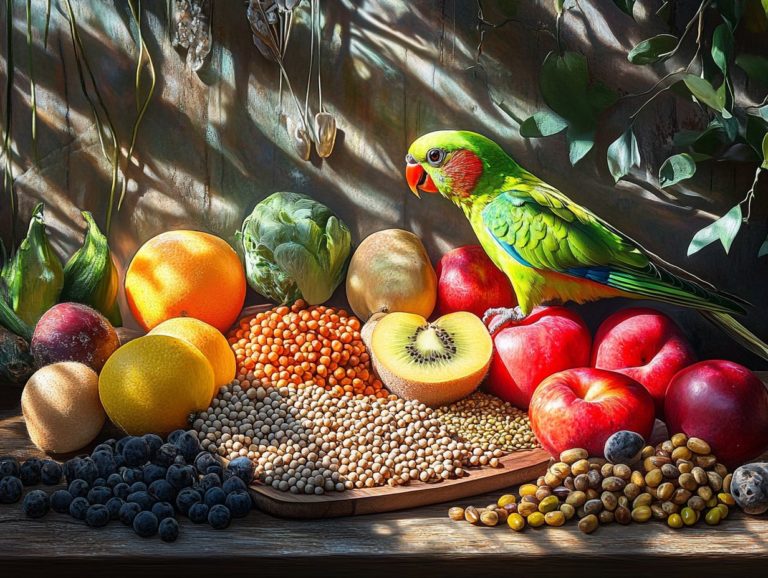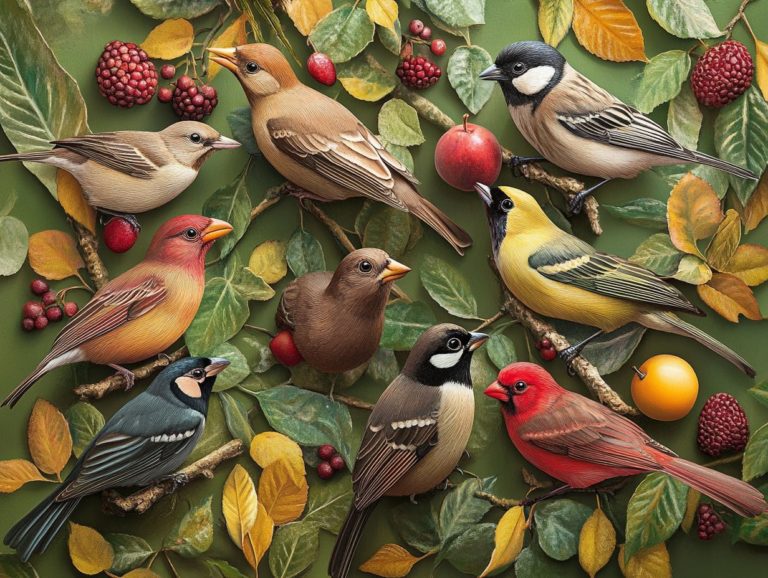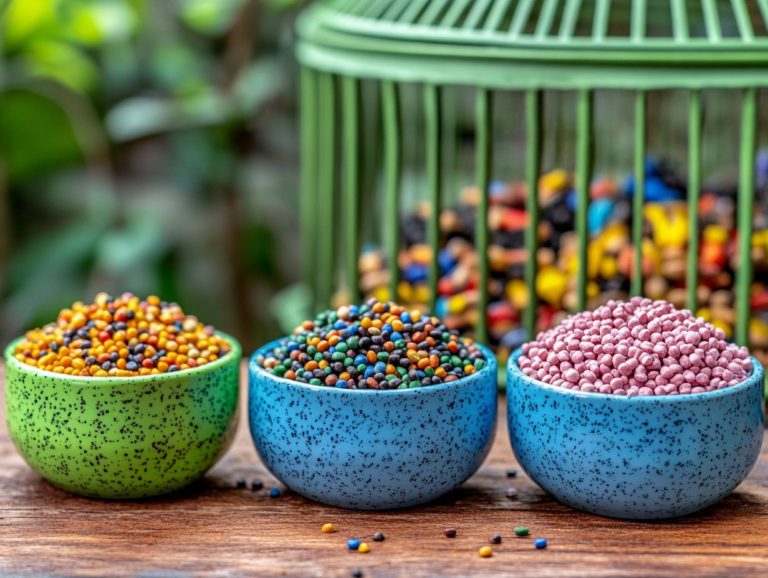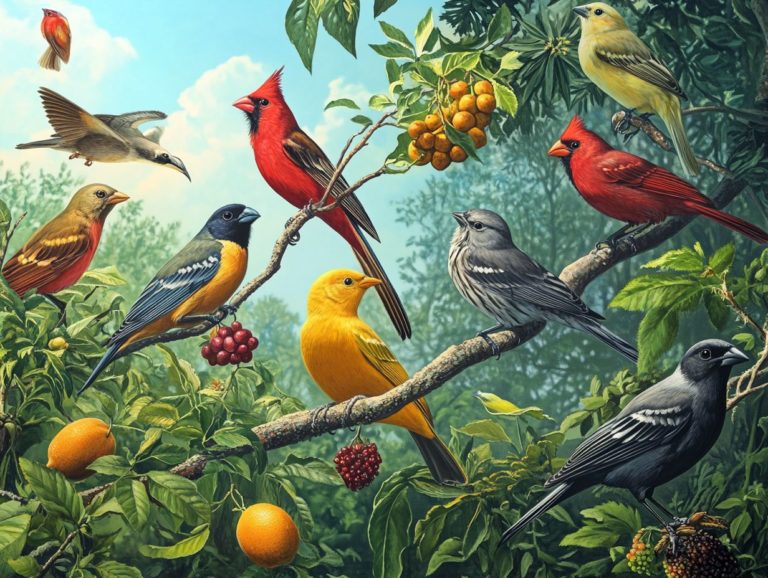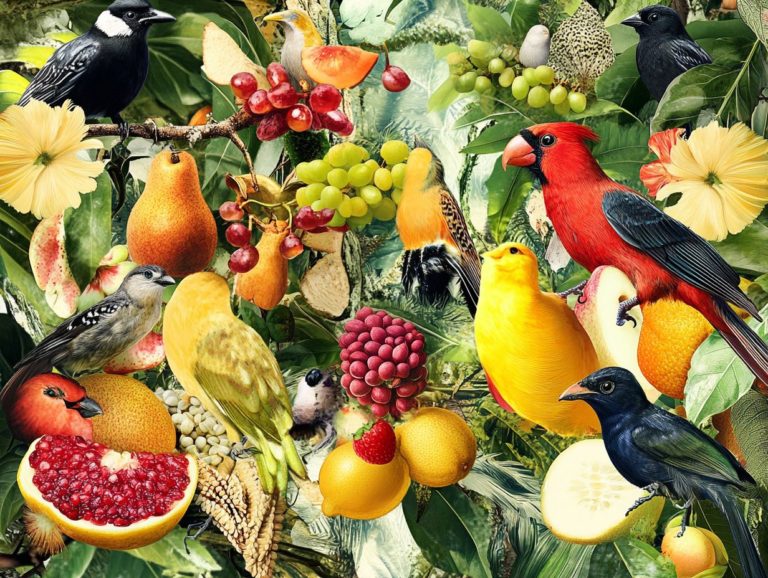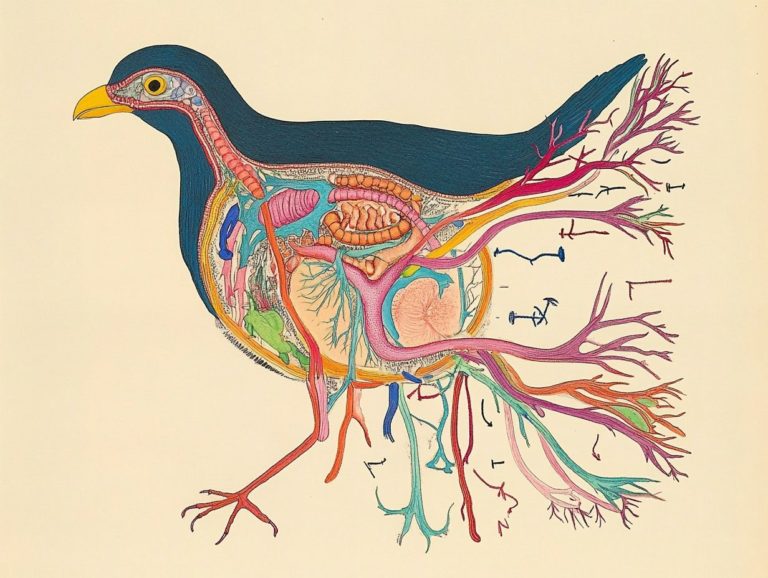Common Dietary Mistakes Bird Owners Make
Proper nutrition is vital for the health and happiness of your feathered friends. However, many bird owners inadvertently make dietary missteps that can have serious repercussions, especially when it comes to choosing the right food for their birds.
From offering unsuitable foods, such as sugary fruits or high-fat seeds, to mismanaging portion sizes and failing to provide enough variety, these common pitfalls can result in physical and behavioral problems for your birds.
This article delves into the most frequent dietary errors, their impacts, and offers practical tips for crafting a balanced diet that meets your birds specific needs.
Discover how to ensure your avian companions flourish with the right nutrition!
Contents
Key Takeaways:
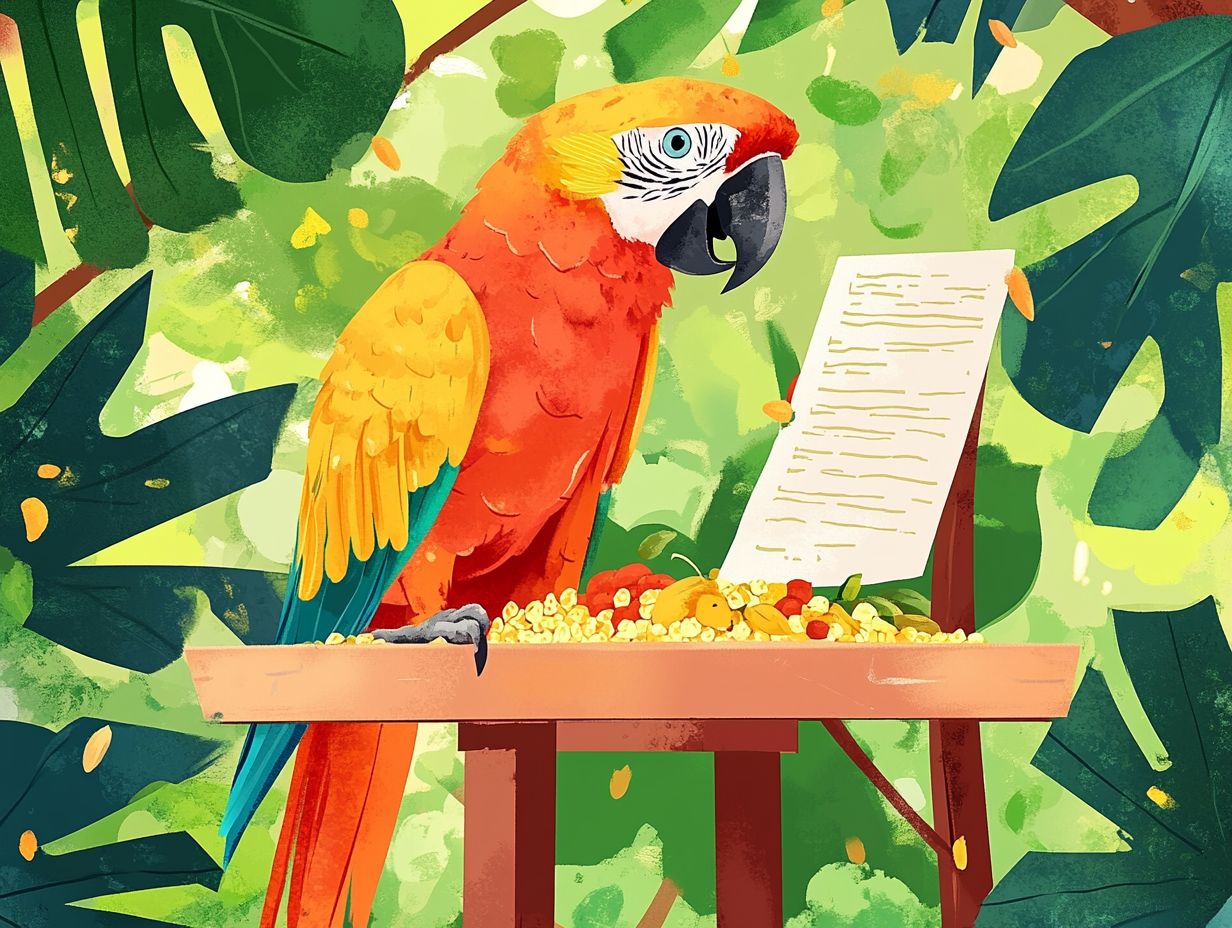
- Many bird owners make the mistake of feeding inappropriate foods, such as seeds or table scraps, which can lead to poor nutrition and health issues.
- It is important to provide a balanced and varied diet for birds to prevent both overfeeding and underfeeding, which can have negative effects on their physical and behavioral health.
- Proper nutrition is crucial for the overall health and well-being of birds, and owners should research and understand the specific dietary requirements of their bird species to ensure a healthy diet.
Importance of Proper Nutrition for Birds
Proper nutrition is essential for your birds, as it directly impacts their overall health, growth, and longevity. A well-balanced diet supports the physical health of exotic birds like parrots, cockatiels, and canaries; it also ensures they have the energy and vitality to engage in their daily activities.
Understanding the nutritional requirements of different species is crucial for you as a bird owner. This knowledge enables you to provide high-quality food that s rich in vitamins, minerals, and other essential nutrients, while ensuring they have access to clean water. Remember, inadequate nutrition can lead to a range of health problems that may require costly veterinary intervention, along with the emotional toll that comes with worrying about your birds.
Common Dietary Mistakes Made by Bird Owners
Are you making these common feeding mistakes? Many bird owners often fall into dietary traps that can compromise the health of their beloved feathered companions. It’s easy to slip up by offering inappropriate foods, such as seeds loaded with fat or processed snacks that lack meaningful nutritional value. To help you avoid pitfalls, check out the top mistakes to avoid when feeding your bird, including some commercial packaged foods that may not be suitable.
Overindulging can lead to obesity, while underfeeding might leave them drained of energy and essential nutrients. Eating the same foods can cause nutritional deficiencies.
Protect your birds’ health by learning proper feeding practices! It’s crucial for owners to arm themselves with knowledge, including how to create a balanced diet for your bird, and seek guidance from a vet whenever uncertainty arises.
Feeding Inappropriate Foods
Feeding inappropriate foods to birds is a common pitfall that can lead to serious health issues. You may unknowingly offer foods that are harmful, such as high-fat seeds or processed snacks that lack essential nutrients. To avoid these mistakes, it’s important to learn about understanding your bird’s dietary habits. These dietary choices can result in obesity, poor nutrition, and other health complications that might require a trip to the vet.
Beyond these risks, certain human foods like chocolate or avocado can be toxic to birds, highlighting the necessity of informed feeding practices. Additionally, avoid the common mistakes when buying bird toys to ensure your pet’s environment is safe and stimulating. Consider providing a balanced diet rich in fruits, vegetables, and specially formulated pellets designed for their dietary needs tailored to your pet’s species. This approach not only nurtures their physical health but also supports their mental stimulation, which is vital for their overall well-being.
Consulting a veterinarian for personalized guidance is highly advisable, ensuring that your bird receives the right nutrients to thrive. By understanding these dietary needs, you ultimately foster a happier, healthier bird.
Get started on a nutritious journey for your birds today! Talk to your vet for tailored advice.
Overfeeding or Underfeeding
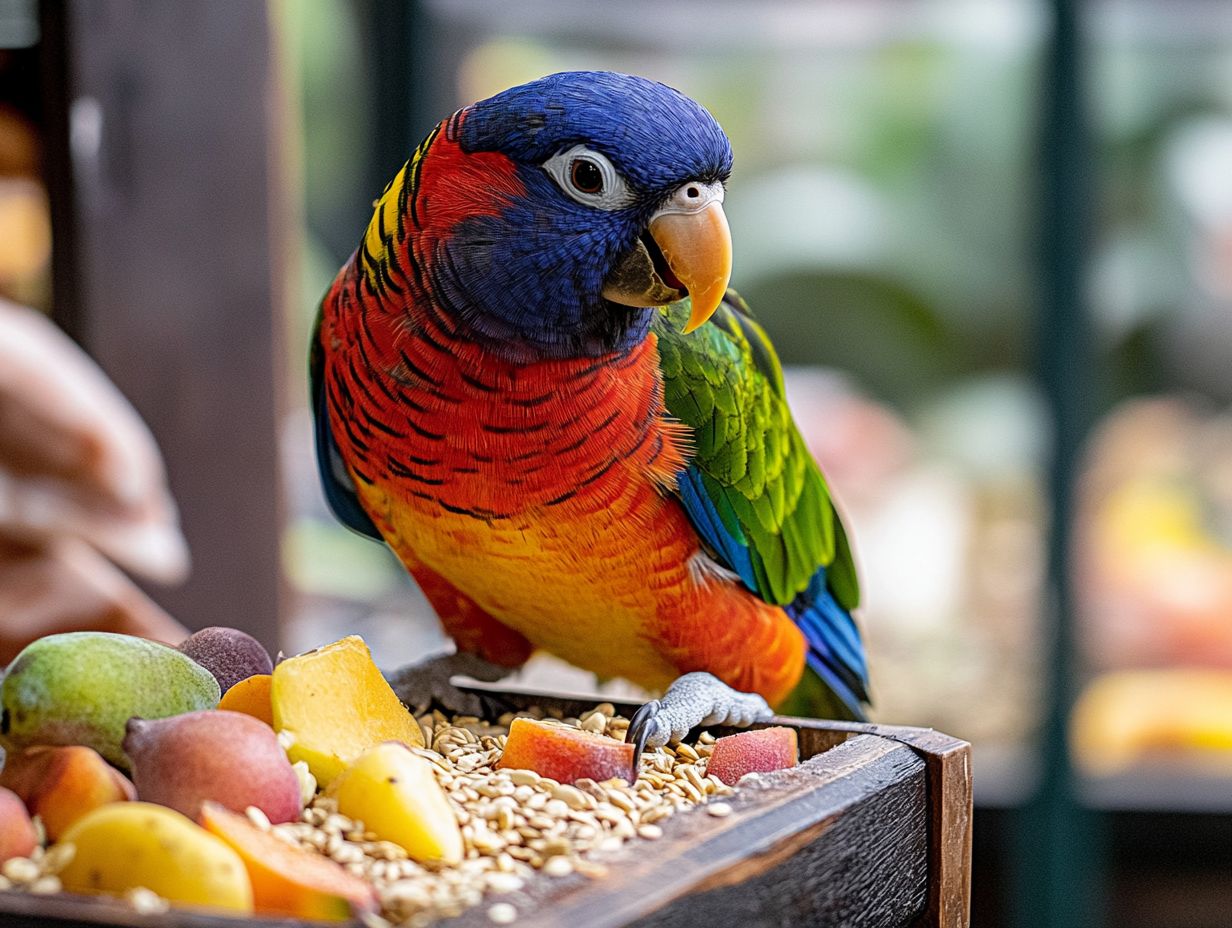
Overfeeding or underfeeding can seriously affect the health of your birds. This leads to issues that impact their quality of life. Overfeeding results in obesity, which can cause heart disease and other significant health problems.
On the other hand, underfeeding robs your birds of essential nutrients, causing stunted growth and weakened immune systems. This may require a trip to the veterinarian.
Statistics show that around 30% of pet birds are considered overweight. As a dedicated bird owner, knowing your pet’s needs is crucial! Understand your feathered companions’ specific dietary needs based on their age and species.
For instance, baby birds typically require more protein than adults. Provide a serving size that s 10-15% of their body weight to keep them healthy. Don t overlook the importance of observing their eating habits.
If your bird consistently leaves food untouched or shows signs of excessive begging, this signals a diet imbalance that needs your urgent action!
Not Providing Enough Variety
Not offering enough variety in your birds’ diet can cause nutritional deficiencies. This ultimately impacts their overall health and vitality.
Pet birds, such as parrots and cockatiels, thrive on a mix of fruits, vegetables, seeds, and pellets. A monotonous diet can lead to boredom, behavioral issues, and health problems.
Incorporating different food types keeps mealtime exciting and supports a well-rounded nutritional profile. Explore options like leafy greens, berries, and root vegetables for essential vitamins and minerals.
Experimenting with various textures and flavors helps you discover what your feathered friends enjoy. Regularly monitoring their preferences ensures they enjoy their meals while maintaining a balanced diet.
By staying attentive and adventurous with their food, you can significantly enhance their well-being and happiness.
The Impact of Poor Nutrition on Birds
Poor nutrition can significantly affect birds’ health, leading to both physical and behavioral issues. When their diet lacks essential nutrients, they may struggle with health problems, including obesity and malnutrition. Malnutrition means not getting the right nutrients.
Poor nutrition can lead to behavioral changes in birds, such as increased aggression or lethargy. This makes their care and overall well-being even more challenging.
Physical and Behavioral Consequences
The physical and behavioral consequences of poor nutrition in birds can be alarming. If your bird suffers from malnutrition, symptoms may include feather plucking, lethargy, or a weakened immune response. This makes them more vulnerable to illness.
Behavioral changes can also manifest, such as increased aggression or withdrawal. These indicate distress due to an unsatisfactory environment and diet.
These signs often arise from deficiencies in essential nutrients, like vitamins A, D, and E. These vitamins are vital for healthy plumage, energy, and overall vitality.
For example, a lack of vitamin A can lead to dull feathers and an unkempt appearance in your parakeet. Similarly, insufficient calcium intake can result in fragile bones, jeopardizing its health.
A lack of dietary variety might cause your bird to feel boredom and frustration. This can turn a typically sociable budgerigar into a loner or cause aggressive behavior towards cage mates.
By paying close attention to these behaviors, you gain insights into your bird s needs. This highlights the importance of a balanced and enriching diet to support both physical health and mental well-being.
How to Correct and Prevent Dietary Mistakes
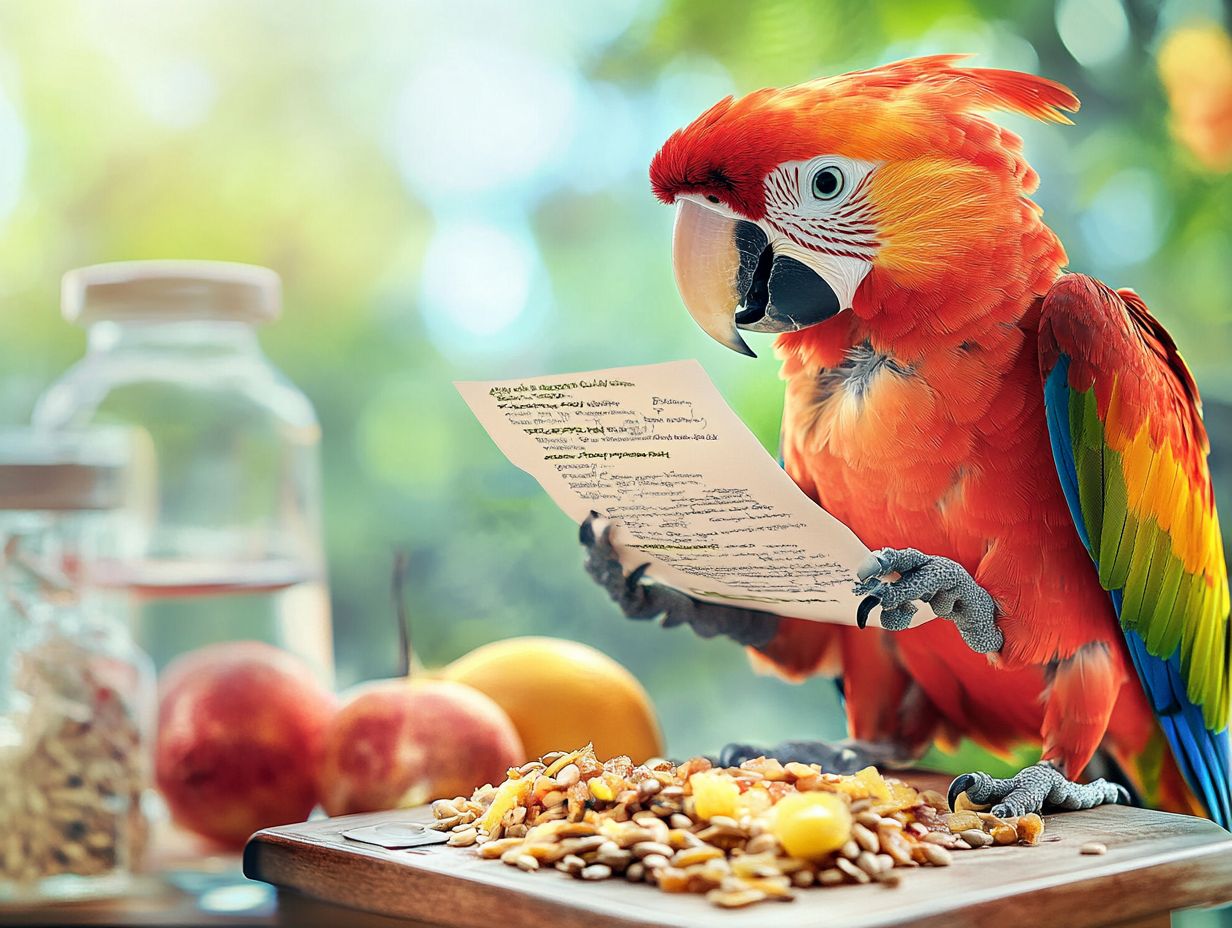
Taking charge of your bird’s diet is both essential and rewarding! Correcting and preventing dietary mistakes in birds demands an active approach from you as their owner. Ensure that the diets you provide truly meet their nutritional needs. It’s crucial to consult with veterinarians who specialize in avian health to create a balanced diet tailored to each specific species, and to be aware of the nutritional myths about birds.
Educating yourself about proper feeding practices is crucial. Regularly checking your birds health can significantly contribute to their overall well-being.
Proper Diet for Different Types of Birds
A proper diet for various types of birds varies greatly depending on their species and individual needs. If you have exotic birds like parrots or budgies, you’ll want to provide them with a balanced mix of seeds, pellets, fresh fruits, and vegetables. This helps keep them in optimal health. Understanding the unique nutritional requirements of each species is essential for ensuring your feathered friends thrive.
For example, if you re caring for raptors, which are birds of prey like hawks and owls, they ll require a protein-rich diet primarily made up of raw meat. On the other hand, canaries and finches do best with a seed-based diet, enhanced with leafy greens. Waterfowl have their own specific needs, including grains and aquatic plants, as well as clean water for drinking.
Given that each bird species exhibits distinct eating habits and digestive requirements, consulting a veterinarian for tailored diet advice can help prevent health issues and promote longevity. Such personalized care can truly make a difference in the overall well-being of your avian companions.
Tips for Creating a Balanced Diet
Creating a well-balanced diet for your birds requires a keen understanding of their nutritional needs and a thoughtful approach to incorporating a variety of foods. Begin by introducing a colorful array of fruits, vegetables, and high-quality pellets. It s essential to monitor portion sizes to strike the right balance neither overfeeding nor underfeeding can contribute to their well-being.
Aim for a vibrant plate, as the different colors often signify a range of nutrients. For example, leafy greens like kale and dandelion greens are fantastic choices, while berries and apples provide essential vitamins. As a general rule, pellets should constitute about 50-70% of their diet, complemented by fresh produce and the occasional seed treat. Establishing a consistent feeding schedule, ideally two to three times a day, will create routine and stability, benefiting your birds.
Keeping a food journal can be invaluable. It allows you to track their preferences and any changes in eating habits, giving you the power to adjust their meals accordingly. This will ensure your feathered companions thrive in optimal health.
Frequently Asked Questions
What are common dietary mistakes bird owners make?
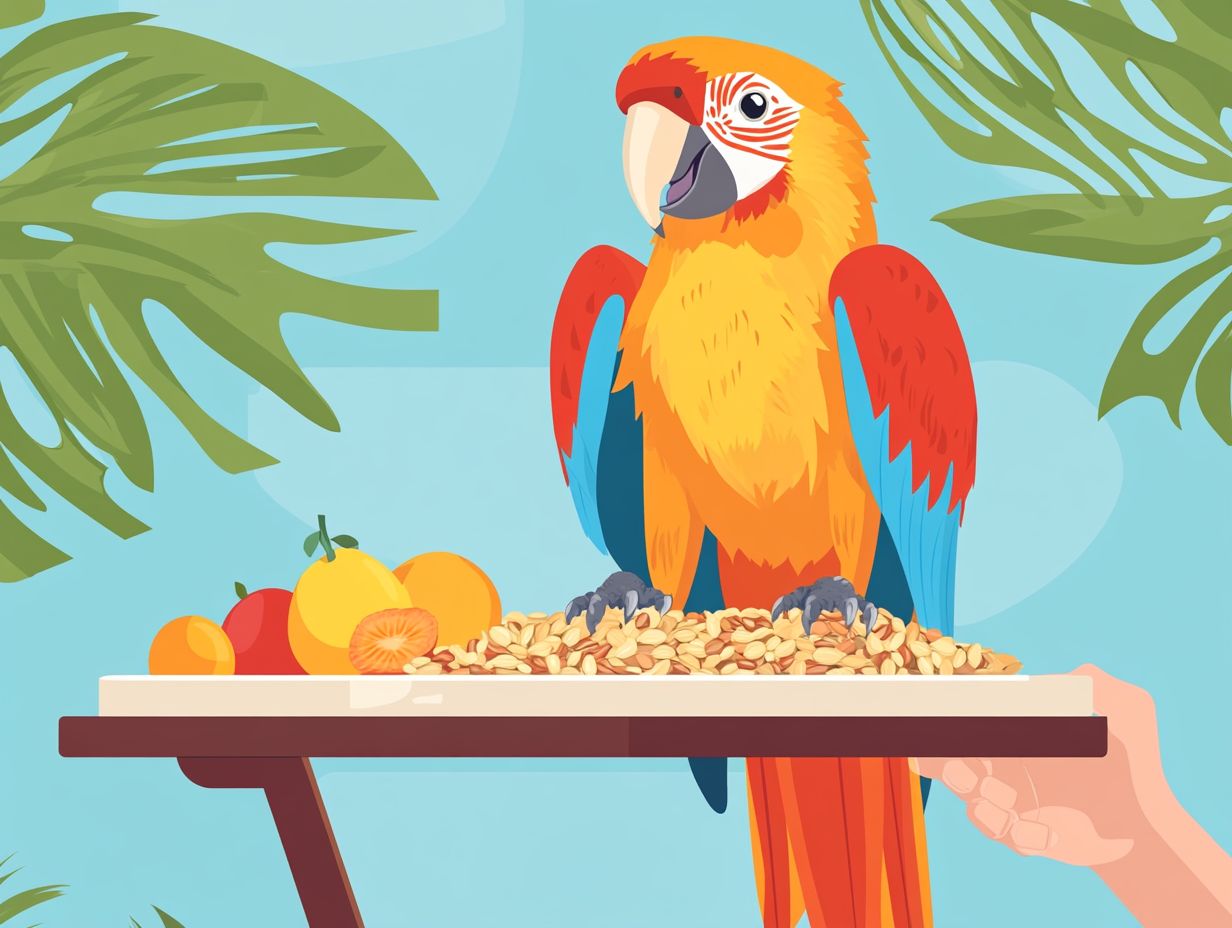
Some common dietary mistakes bird owners make include giving their birds an unbalanced diet, overfeeding them, and not providing enough variety in their food. Additionally, neglecting proper cleaning of feeders can contribute to these issues, as highlighted in the guide on common dietary mistakes bird owners make.
Why is giving an unbalanced diet a common mistake?
Many bird owners may not realize that birds require a specific balance of nutrients in their diet. This includes a mix of fruits, vegetables, grains, and protein. To ensure your bird thrives, it’s important to follow the dos and don’ts of feeding your parrot, as feeding too much of one type of food can lead to deficiencies or health issues.
How can overfeeding be harmful to birds?
Overfeeding can harm birds. It can lead to obesity and health issues like fatty liver disease.
Follow feeding guidelines and monitor your bird s weight. This ensures they receive the right amount of food.
Why is variety important in a bird’s diet?
Just like humans, birds can get bored with the same food each day. A mix of fruits, vegetables, and grains keeps them interested and ensures they get the nutrients they need.
Is it safe to give my bird table scraps?
No, birds should not eat table scraps. Many human foods like chocolate, avocado, and onions are toxic to them.
Stick to foods specifically meant for birds.
What should I do if I suspect my bird’s diet is lacking?
Think your bird might need a diet boost? Consult a vet who specializes in birds.
They can help balance your bird’s diet and recommend necessary supplements.

